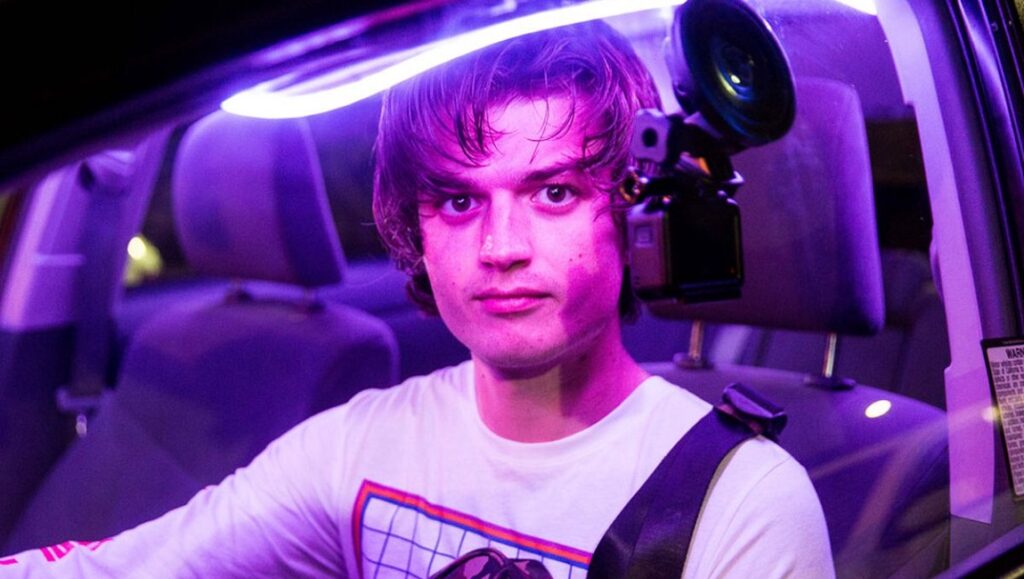Spree represents a futuristic cinema, engaging both new media modes and psychologies of the digital age in a vision both appealing and deeply frightening.
Spree is the movie we’ve been subconsciously anticipating for the last few years (albeit with varying levels of enthusiasm, I’m sure), a movie that confidently bridges the distance between old and new media without selling out either. Over the past couple years, we’ve seen a handful of films that attempt to address cinema’s waning influence in the presence of new (social) medias, but none have really understood these mediums and their influence as completely as Spree does. We’ve seen movies like Unfriended and Personal Shopper that successfully merge cinematic editing and montage with the aesthetics of new digital mediums, and we’ve had movies that use these new mediums as means of understanding the psychology of younger millennials/Gen-Z (Ingrid Goes West, Nerve) — Spree unites these two threads in a remarkable fashion.
The film takes place over the course of a single day, with the bulk of the action being filmed and stylized to look like a livestream the likes of which you’d see on Twitch (with occasional cutaways to Instagram, YouTube, and eventually 4Chan and even body cam footage). Spree’s other ploy is that it mostly takes place in a car, specifically a rideshare operated by Kurt Kunkle (Joe Keery) who has outfitted his car with a comprehensive webcam setup that allows him to stream his rides in real time, thus setting the stage for a particularly grisly bid for internet virality. Of course, “psychotic Uber driver who is also a Twitch streamer” is the sort of pitch that is, on its face, high concept nonsense, but in reality, Spree is shockingly effective thanks to Keery and writer/director Eugene Kotlyarenko. Given the novelty of its premise and aesthetic, it wouldn’t be unfair to assume that Spree exists for cynical reasons, but while the film does inevitably score points by virtue of essentially being the first to execute this concept, Kotlyarenko and Keery are gleefully committed to this project — nothing feels ill-considered or cheap.
For those who have followed Kotlyarenko’s career thus far, none of this should be surprising exactly, though it is heartening. A genuinely independent filmmaker, Kotlyarenko has spent the past decade writing, directing, and often acting in intimate, post-mumblecore (sorry, it’s apt) comedies dealing with the interpersonal grievances and slights of various wayward millennials. Spree marks a major advancement in visibility and budget for Kotlyarenko (the film boasts Drake as an executive producer), but it’s a project consistent with his established interest in contemporary communication — both the mediums used and literal language — and the increasingly blurred line between the curation of a brand and the curation of a personality. His previous feature Wobble Palace explored this quite literally, using the end of a millennial couple’s relationship as a means of questioning their general authenticity, and in this way Spree can be seen as the next logical (gonzo) step — the line between societal performance and authentic self completely dissolved as brand curation becomes not just a cultural necessity, but a financial one. Balancing out this sort of serious-minded social critique alongside humor and genre antics surely isn’t a simple trick to pull off, but in Keery, Kotylarenko has a game and talented collaborator, his performance perfectly in tune with the film’s precisely confrontational tone. The script requires Keery to embody both the unpracticed insecurity of an amateur streamer and a more indistinct creepiness, while still pitching toward a generally comedic tone. It’s a skillful performance that blessedly never surrenders to mere patronizing, and the fact that Keery appears in nearly every scene, often speaking directly at the camera, makes it all the more impressive in its consistency.
And indeed, this is why Spree is so successful at what it sets out to do. Both director and performer have a keen grasp of what makes this world so alternately appealing and frightening, and they are able to recreate it accurately because they too find it bewitching and repellent in almost equal measure. At times the screen will erupt into a flurry of visual information, multiple screens competing for attention with a rush of text-based commentary off in the corner, anonymous users offering up derogatory quips about the onscreen proceedings. It’s common imagery within the world of streaming broadcasts, but as contextualized in narrative cinema here, there is a clear recognition of its compositional qualities, so breathtaking and very modern, but also overwhelming and sort of deadening. Fitting, then, that it also happens to reveal the increasing distance between traditional cinematic aesthetics and those that are now commonplace in internet medias. What Spree accomplishes is indeed vital and contemporary, but the film also recognizes that, regardless of moral implications, the live stream is the medium of our moment and, willing or not, we’re already along for the ride.


Comments are closed.